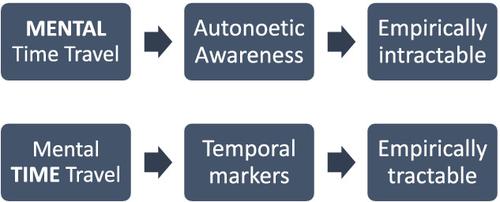当前位置:
X-MOL 学术
›
WIREs Cogn. Sci.
›
论文详情
Our official English website, www.x-mol.net, welcomes your feedback! (Note: you will need to create a separate account there.)
It is about time: Conceptual and experimental evaluation of the temporal cognitive mechanisms in mental time travel.
WIREs Cognitive Science ( IF 3.9 ) Pub Date : 2020-04-27 , DOI: 10.1002/wcs.1530 Gema Martin-Ordas 1
WIREs Cognitive Science ( IF 3.9 ) Pub Date : 2020-04-27 , DOI: 10.1002/wcs.1530 Gema Martin-Ordas 1
Affiliation

|
Mental time travel (MTT) is the ability that allows humans to mentally project themselves backwards in time to remember past events (i.e., episodic memory) or forwards in time to imagine future events (i.e., future thinking). Despite empirical evidence showing that animals might possess MTT abilities, some still claim that this ability is uniquely human. Recent debates have suggested that it is the temporal cognitive mechanism (i.e., ability to represent the sense of past and future) that makes MTT uniquely human. Advances in the field have been constrained by a lack of comparative data, methodological shortcomings that prevent meaningful comparisons, and a lack of clear conceptualizations of the temporal cognitive mechanism. Here I will present a comprehensive review into MTT in humans and animals—with a particular focus on great apes. I will examine three of the most prominent and influential theoretical models of human MTT. Drawing on these accounts, I suggest that a basic way of understanding time might be shared across species, however culture and language will play a critical role at shaping the way we elaborate mental representations about past and future events.
中文翻译:

关于时间:精神时间旅行中时间认知机制的概念和实验评估。
精神时光旅行(MTT)是一种功能,它使人类能够在精神上向后投射自己,以记住过去的事件(即情节性记忆),或者向前进以想象未来的事件(即未来的思维)。尽管经验证据表明动物可能具有MTT能力,但仍有一些人声称这种能力是人类特有的。最近的辩论表明,正是时空认知机制(即代表过去和未来感的能力)才使MTT成为人类独特的人。由于缺乏比较数据,无法进行有意义的比较的方法学缺陷以及缺乏对时间认知机制的清晰概念化,制约了该领域的进展。在这里,我将对人和动物的MTT进行全面的回顾,特别是针对大猿猴。我将研究人类MTT的三种最杰出和最有影响力的理论模型。利用这些说明,我建议在物种之间可以共享一种基本的理解时间的方式,但是文化和语言将在塑造我们详细阐述过去和未来事件的心理表现方式方面发挥关键作用。
更新日期:2020-04-27
中文翻译:

关于时间:精神时间旅行中时间认知机制的概念和实验评估。
精神时光旅行(MTT)是一种功能,它使人类能够在精神上向后投射自己,以记住过去的事件(即情节性记忆),或者向前进以想象未来的事件(即未来的思维)。尽管经验证据表明动物可能具有MTT能力,但仍有一些人声称这种能力是人类特有的。最近的辩论表明,正是时空认知机制(即代表过去和未来感的能力)才使MTT成为人类独特的人。由于缺乏比较数据,无法进行有意义的比较的方法学缺陷以及缺乏对时间认知机制的清晰概念化,制约了该领域的进展。在这里,我将对人和动物的MTT进行全面的回顾,特别是针对大猿猴。我将研究人类MTT的三种最杰出和最有影响力的理论模型。利用这些说明,我建议在物种之间可以共享一种基本的理解时间的方式,但是文化和语言将在塑造我们详细阐述过去和未来事件的心理表现方式方面发挥关键作用。


























 京公网安备 11010802027423号
京公网安备 11010802027423号